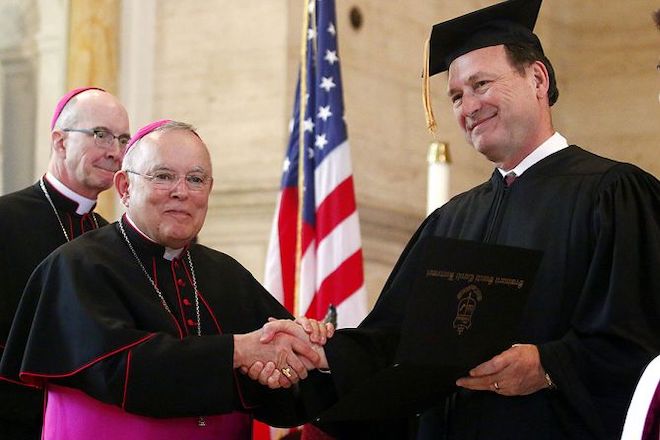SCOTUS hollows out America
US Supreme Court ... Overturning Roe v Wade and other travesties ... Using religious beliefs to alter secular law ... Gutting civil rights remedies ... Looser gun regulations ... The malignant Fifth Circuit ... From Our Man in Washington, Roger Fitch
"…[I]t's time to discuss religion whether we like it or not, because it's no longer knocking on the door: Sam Alito just sent it in the house with a no-knock warrant and stun grenades that threaten to catch the place on fire" - Thom Hartmann
 With Trump gone, the focus in Republican psychopathology has turned to individual supreme court justices, e.g, the ethically-challenged Clarence Thomas, yet one should never forget his fellow-traveller, Sam Alito, because Justice Alito is one angry man.
With Trump gone, the focus in Republican psychopathology has turned to individual supreme court justices, e.g, the ethically-challenged Clarence Thomas, yet one should never forget his fellow-traveller, Sam Alito, because Justice Alito is one angry man.
There's been an unprecedented leak of Alito's draft majority opinion in the forthcoming abortion decision, Dobbs v Jackson Women's Health, set to overrule Roe v Wade, and the justice's grasp of history has been faulted: resurrecting ancient common law, he applies a legal narrative more consistent with the 17th century than a US history with remedies for "quickening".
Some see an intellectually-dishonest exercise designed to mask Alito's orthodox, powerful, but legally-irrelevant Roman Catholic beliefs: consider his alarming footnote on a shortfall in adoptable infants.
It seems a foot in the door for a faith-based system in the US where religiously-defined morality displaces law, a nation where religious adherents become the most sympathetic plaintiffs before a court that intends to use religious belief to alter secular law.
Overturning Roe v Wade is, in this analysis, but one front in a religious war against America, and the draft opinion suggests that the conservative justices don't plan to stop with Roe. The impression that they don't mind being an extension of the Republican Party has lawyers wondering what's coming next.
Dobbs will have consequences, as many civil rights will be threatened, e.g, same-sex marriage. The leak itself may affect decisions in other cases: e.g, guns and environmental protections..
Most fundamentally, the Dobbs draft endangers the right to privacy first formulated in 1890 by the revered future supreme court justice, Louis Brandeis, and the 1923 decision adopting it.
 Alito: intellectually dishonest
Alito: intellectually dishonest
According to law prof Melissa Murray:
"A decision overruling Roe v. Wade would threaten an entire line of jurisprudence rooted in the 14th Amendment's guarantee of liberty ... [going] back to a 1923 decision guaranteeing parents the right to raise their children free of undue state intervention, and it includes the right to marry, the right to engage in adult sexual relationships and the right to use contraception."
Besides birth control, medical assistance in pregnancy is in question, even after miscarriages, and creation of life in vitro.
Sherry Colb believes IVF treatment won't be a problem: for Alito:
"... women are soil where men can plant their seeds, and soil has no right to uproot the plants that start growing. People who seek IVF, by contrast, do not challenge the role of women in our society. IVF places women in a state of pregnancy, which is where [Alito] wants them."
≈ ≈ ≈
Even before the "abortion leak", the supreme court began gutting civil rights remedies: at least five radical decisions are already out.
The court upheld Ted Cruz's leveraged buyout of his senate seat, where he "loaned" himself the purchase price, and investors repaid him after success, a scheme characterised as "streamlining the process for bribing senators".
It was another case of the court "weaponising" the First Amendment to knock out campaign finance restrictions, more here.
 Cruz: owned by his campaign investors
Cruz: owned by his campaign investors
Money talks, and has a constitutional right to do so, never mind where it comes from or the circumstances in which it's paid.
While "green-lighting political corruption", the court made immigration more difficult. In Patel v Garland, a decision by the court (Gorsuch dissenting) made it harder to rectify immigration injustices.
Criminal justice also took a hit. In Shinn v Martinez Ramirez, the court effectively decided that death row prisoners "don't deserve competent lawyers", with the Republican majority further hollowing-out habeas precedents, more here.
Michael Dorf and Liliana Segura commented on the selective treatment of precedents by the court.
Anti-discrimination law was not left undisturbed. In Cummings, the court struck out liability for emotional distress damages, making it easier for employers to discriminate. However, shortly after the opinion was released, it was discovered that a 2009 amendment to the federal Rehabilitation Act at issue provided just such relief.
All parties involved had been unaware of the mistake. A petition for rehearing has been filed and the court should vacate its decision, but will it?
What's next this term?
Notwithstanding the school shooting in Texas and the arguably sordid origins of the Second Amendment, the court is almost certain to broadly expand "gun rights" by loosening effective arms regulations in those states which (unlike Texas) have effective and long-standing gun laws.
It's part of the lust for unfettered access to guns for personal use, outside a military or defensive context or demonstrated need, a public mania first sanctified in the appalling Heller decision (2008).
 More guns, less regulation
More guns, less regulation
The early cases in this court's judicial activism centred on city and state laws and regulations, but more recently the astonishing Shelby County v Holder (disembowelling the near-unanimously re-enacted Voting Rights Act 1965) and Citizens United v FEC (striking laws limiting political contributions) presented a new and greater problem: judicial nullification of Acts of Congress.
Formerly a rare event, it's been reignited by a supreme court bent on giving more power to autocratic (mostly Republican) states.
Hardened Republicans among the party operatives appointed to the federal bench by Donald Trump are still trying to implement the programs of the disgraced and departed president, especially in the district courts of the fifth circuit where, 18 months after the Trump administration was removed, a court is preventing Mr Biden from altering Trump policies in immigration, a field where states have no authority.
The fifth circuit judges have also betrayed a stunning ignorance of First Amendment jurisprudence in upholding a new Texas internet censorship law imposed on social media. A Lawfare Podcast has more.
With its 12 Republican appointees (six of them Trumpistes) the fifth remains the most malignant of the circuits. In an unprecedented recent ruling, Jarkesy v SEC, a divided panel rewrote administrative law to require a jury trial for defendants (in this case a hedge-fund trader) in a civil, not criminal, suit by the SEC.
As Vox headlined, "A wild new court decision would blow up much of the government's ability to operate".
Interestingly, the panel's astounding decision was tipped by the inclusion of the Trump-appointed judge Andrew Oldham, a former law clerk for Justice Alito.
Congressional legislation is now needed to fix the supreme court's legislating efforts affecting corporate regulators like the SEC and, even more urgently, the FTC.
Meanwhile, Trump's holdover statutory appointees to such commissions continue to obstruct the new government's initiatives, e.g, the Federal Electoral Commission's investigation of Trump regime money laundering.
No comments:
Post a Comment